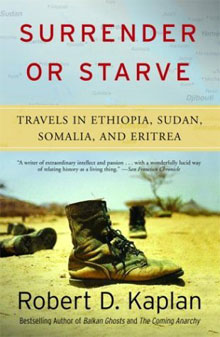Book Notes
 Robert Kaplan, Surrender or Starve; Travels in Ethiopia, Sudan, Somalia, and Eritrea (New York: Vintage, 1988, 2003), 222pp.
Robert Kaplan, Surrender or Starve; Travels in Ethiopia, Sudan, Somalia, and Eritrea (New York: Vintage, 1988, 2003), 222pp.
I have enjoyed reading a half-dozen books by Robert Kaplan, a journalist who writes about foreign affairs for the Atlantic Monthly, and this one was no exception. Although some critics consider Kaplan's analyses as overly pessimistic, most give him high praise for his skill in combining first person travel narrative, history, geo-political analysis, and a street-level view of what is unfolding in the farthest corners of our world. Surrender or Starve was first published in 1988, right after the epic famines that devastated the Horn of Africa from 1984-1987; this new edition includes a new foreword and a postscript on Eritrea (which declared independence from Ethiopia in 1991 after a thirty-year war).
Kaplan is an unapologetically opinionated writer. Most of the media covered the famines that devastated eastern Africa as caused by horrible droughts, which is partly true. But Kaplan insists that Africans, and not only God, were also to blame, because the famines were greatly exacerbated by ethnic conflict and class warfare. In Sudan, the northern Muslim government in Khartoum ignored the plight of Christians in the south. In Ethiopia, the ruthless Marxist regime of Mengistu Hailie Mariam (1977-1991) turned the famine into a weapon of war against the ethnic Oromos, Tigreans and Eritreans. Massive "villagization" or forced collectivizations that displaced five million people were hailed by Mengistu as "famine relief." In 1986, for example, the World Human Rights Guide "gave Ethiopia the lowest rating of any country in the world" (p. 81). Today Ethiopia remains one of the poorest countries in the world. What makes Kaplan such an engaging writer is his stated intention to think and write about Africa in "a bold, unpopular, but more realistic way, judging Africa by the same standards of moral conduct that would apply to any other part of the globe" (p. xii). Characteristic of all his books, Kaplan thus places himself squarely in the tradition of realpolitik as opposed to all forms of political idealism.


